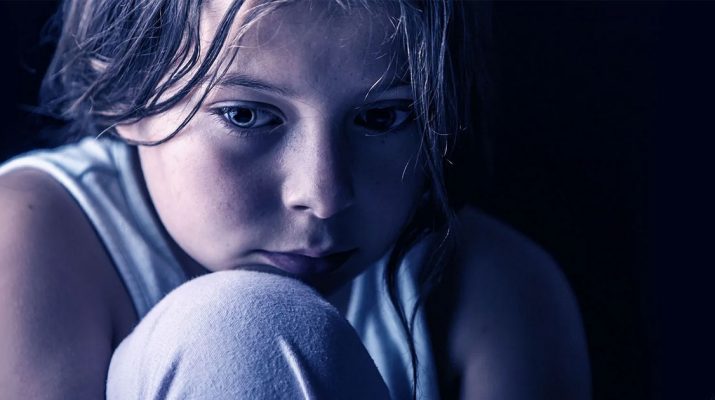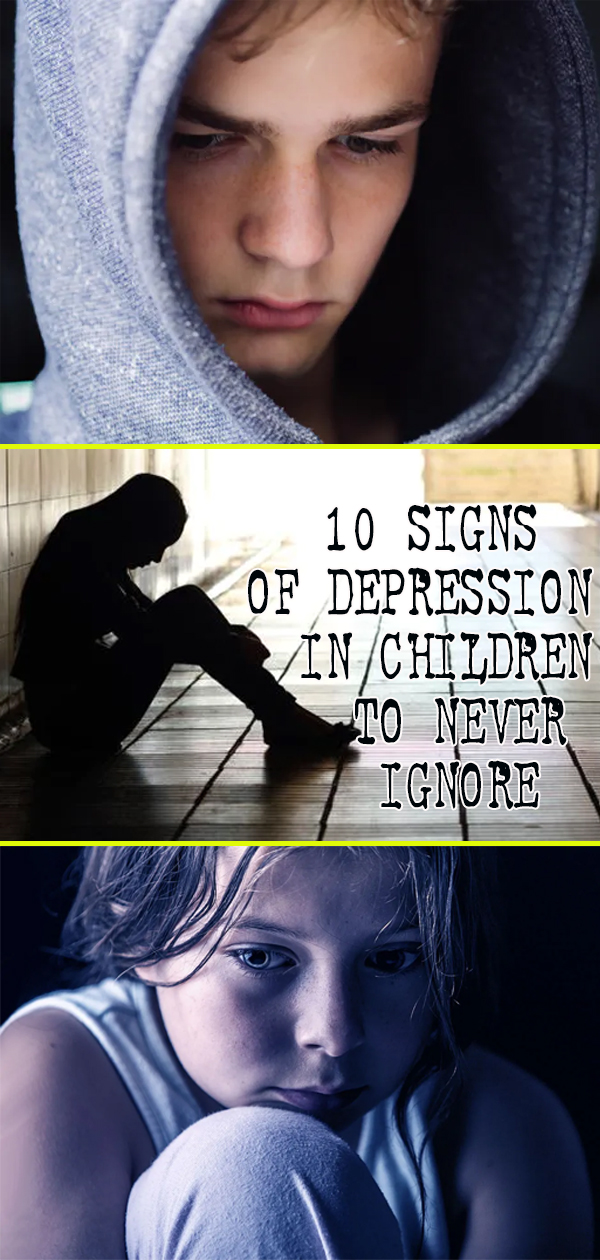Depression is an ailment encompassing the body, thoughts and moods and impacts the manner an individual eats and sleeps, the manner they feel about themselves, and the way you reason about stuff. Unfortunately, the disease also impacts our children.
Childhood depression is not similar to the typical “blues” and routine emotions that take place as the kid grows. The child may have depression when indicators last and affect interests, social activities, family life, and schoolwork. Depression is curable, even though it is a serious condition.
Depression is classified into two types: major depression and dysthymia. Major depression lasts about two weeks, and in the life of your kid, it might happen more than once. Your child might go through significant depression following a disturbing incident like the demise of a relative or friend. Dysthymia is not so severe but is a prolonged form of depression lasting for no less than two years.
10 Warning Signs Of Depression In Children That You Must Not Overlook
1. Sadness And Sluggishness
The kid may suffer from hopelessness and lowness. They may perhaps cry easily. Some of them shall hide away their tears by getting reserved. Children suffering from depression often react, walk, and talk slower. They might be less playful and active than usual.
2. Lack Of Attention And Displeasure
A kid who has continuously loved playing sports, for instance, might abruptly choose to not engage in such activities anymore. They might turn down a suggestion to partake in stuff, which they have continuously enjoyed before or complain of being “bored.”
3. Nervousness And Tension
Dejected children might not be able to sit still or have signs of tension through restlessness. Anxiousness, panic, and tension might be seen in the child. The anxiety source may provide you a hint to what is initiating the depression.
4. Confusion And Gloominess
The child might turn short-tempered and troubled. As a consequence of the distress, they are experiencing they may lash out in anger or get moody. Individuals with depression may become cynical, identifying themselves, their environment, and their life, in an awful portrayal.
5. Guilt, Self-Harm, And Feeling Of Unimportance
Children who are depressed may have an obsession with their supposed disappointments and mistakes, feel so guilty, and assume they are of no use. People who are depressed may cause physical pain to themselves or take extreme risks. A good illustration of such actions is self-injury.
6. Vulnerability And Desperateness
To let go their depression feelings disheartened children often think nothing can be done about their condition. Specifically, kids with dysthymia might observe that this is “their normal life” as this is their only know-how.
7. Seclusion Feelings
A child who has frequently been harassed may turn out to be so sensitive to any offend from his friends.
8. Changes In Weight Or Eating Habits
Appetite either increases or decreases in most persons with depression. Those who typically have a desire for food may unexpectedly lose concern for eating. Youngsters may as well respond in a reverse manner, by overeating food to self-treat their emotional state.
9. Sleeping Disorders
Depressed children might have strain falling asleep and remaining asleep when they do. Oversleeping or waking up too early might be experienced. During the day at school, they may struggle to stay awake.
10. Withdrawal And Avoidance
Children suffering from depression may sidestep daily or pleasurable endeavors and tasks. They might withdraw from family and peers. The bedroom can turn into a preferred place to find privacy.
When signs last shortly, it might be a temporary situation of “the blues.” However, if they take over two weeks and hinder normal routine activities and school life, the child may be facing depression.
Causes Of Depression In Kids
Causes of depression are not known precisely. Akin to numerous mental disorders, various aspects might be the culprit, for example:
1 – Brain Chemistry
Neurotransmitters are inherently occurring brain chemicals that possibly are a depression factor. Fresh studies show that variations in the function and influence of the neurotransmitters plus the manner of interaction with neuro-circuits tasked in upholding attitude constancy might have a role in despair and its cure.
2 – Genetic Differences
Depressed persons seem to have physical alterations inside their brains. The impact of these fluctuations is still unclear; however, it might eventually aid to determine the causes.
3 – Hereditary Behaviors
Those whose blood lineages also have this disorder, depression is more prevalent. Scientists are attempting to discover the genes involved in triggering depression.
4 – Hormones
Changes in the hormonal balance of your body may be engaged in promoting depression. Hormonal changes can materialize with pregnancy plus after delivery (postnatal) and from thyroid difficulties, menopause, or several other situations.
Other Situations To Watch Out For
Depression influences kid’s thinking in addition to their conduct and attitude. They might reason that things shall never get improved or they are of no value. Suicide thoughts can also be seen in some children.
It is imperative to take this matter seriously if your kid speaks of hurting themselves or committing suicide. Kids at times employ this as a means of telling their suffering instead of an intention to injure themselves – whichever way; they require immediate support.
What Should A Parent Or Caregiver Do?
1 – Discern When To Look For Expert Aid
A healthy way of life and care can make a significant difference for depressed children; nevertheless, it is not always sufficient. Don’t shy off from getting expert aid from a mental health expert with lots of experience treating kids if depression is severe.
2 – Kid Involvement In Treatment Selections
Always get your child’s feedback when hunting treatment alternatives or choosing a professional. Do not disregard their inclinations or make solo decisions if you want the kid to be involved and interested and in the treatment. No single cure works for everybody, and no individual counselor is a miracle worker. Look for an appropriate fit if your child does not ‘connect’ with the psychologist or feels awkward.
3 – Look At The Alternatives
Anticipate a dialogue with the expert you chose regarding your child’s depression treatment choices. For slight to sensible cases of depression, talk therapy is habitually a great preliminary cure. Your kid’s depression might resolve during therapy. Medicine may be needed if it does not happen.
It is significant for individuals to ask queries about treatment or if one is not pleased with, the mental health attention their kids get to talk over their anxieties with the caregiver.
What Should You Expect From Treatment?
Depression treatment can consume time and at times, encompasses some trial and error. It is essential to tolerate the procedure to aid your kid feel secure and remember no two kids are similar.
Therapy:
For kids stressed with depression, psychotherapy is an apt alternative. There are several varieties of treatment, and what functions for one may not work for someone else. Play therapy is an alternative for very young kids. Cognitive Behavioral Therapy (CBT) can be useful for older children. It might take time to discover the right therapist for the patient. Do not be terrified to ask queries; you understand your kid best.
Education:
The vital first step is educating your child regarding depression. This assists the child appreciate the likely causes (environmental factors, genetics, harassment, anxiety), understand brain chemistry and decreases self-guilt. What your child is suffering from gets normalized.
Medication:
For modest to complicated cases, medication might be essential; however, medication works excellently when joint with therapy. It is necessary to have medication management.
Hospitalization:
At times, admission is necessary for serious depression cases, counting suicidal ideas.
How To Manage Depression In Children
Depression in children cannot always be prevented. When your child has a mental health problem, however, you can take steps to advance your kid’s mental health proactively.
Show them how to, manage emotions, solve issues in healthy ways, and cultivate approaches that shall assist her cope with hindrances and disappointments. Make staying fit a priority in your family and talk regarding your mental health as well.
Without over-programming their time, help your child grow a productive social life. Reward them for being responsible after the accomplishment of their assigned responsibilities.
Speak of how caring for their body also benefits the mind. For good mental health, it is essential to get sufficient exercise, eat wholesome food, and sleep enough each night.
Final Thoughts On Childhood Depression
Remember, there are mostly two depression types. In the primary depressive ailment—the most prevalent depression form—the signs transpire in what might be severe incidents that last approximately seven to nine months. However, there exists another depression form known as dysthymia, wherein symptoms are insignificant, but last longer or even years.
Consequently, while the dysthymia experience might be less incapacitating for the kid, a greater threat exists. And that danger is more accumulated damage from the additional time the kid is locked out of healthy growth development.
Depression in kids arises from an assortment of causes and is reasonably treatable. If you suspect your child struggles from chronic depression, don’t wait. Seek professional advice. You will then be able to offer therapy in settings at school, home, and in a professional environment.
The key is to have an action plan to help your kid. It is not acceptable to ignore the issue or hope depression might go away. Treatment is vital to treating depression in children.


